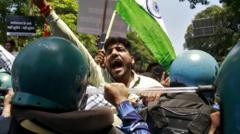The ongoing conflict between India and Pakistan intensifies as diplomatic measures and allegations fly after a deadly attack blamed on Pakistani militants.
**Escalation of Tensions: Pakistan Halts Indian Visas After Kashmir Attack on Tourists**

**Escalation of Tensions: Pakistan Halts Indian Visas After Kashmir Attack on Tourists**
Pakistan's suspension of Indian visas marks a significant increase in hostility following the tragic killing of 26 tourists in Kashmir.
In a dramatic escalation of cross-border tensions, Pakistan has implemented an immediate suspension of all visas for Indian nationals following a militant attack in Indian-administered Kashmir that resulted in the deaths of 26 tourists. This decisive action comes alongside a series of reciprocal measures, including the expulsion of Indian diplomats and a closure of airspace to Indian flights.
Authorities in India have identified three suspects associated with the attack, two of whom are reportedly Pakistani nationals linked to the militant outfit Lashkar-e-Taiba, with Pakistan firmly refuting any involvement. In a turbulent atmosphere, Prime Minister Narendra Modi declared India's commitment to seeking justice against the terrorists and their supporters, asserting that those responsible will face unprecedented repercussions.
In the wake of the attack, which transpired in a popular tourist area near Pahalgam, Indian authorities launched a stringent crackdown, detaining approximately 1,500 individuals for questioning, while educational institutions and businesses resumed operations following a period of intense shutdowns.
In retaliation for India’s moves, Pakistan has responded by discontinuing visa services for Pakistani citizens and firmly resisting India's attempts to halt the Indus Water Treaty. They warned that any diversion of river waters would be regarded as an act of war. Moreover, the number of Indian diplomats in Islamabad has been significantly reduced, now limited to thirty personnel, while India has shut down the main border crossing, the Attari-Wagah border.
An emotional wave swept through India as the victims' families mourned their loved ones, and reports surfaced indicating escalating harassment towards Kashmiri students across various Indian states, revealing a troubling social backlash in the aftermath of the attack. Videos circulated showing threats against Kashmiri Muslim students, fueling concerns over community safety amidst the growing animosity.
As Kashmir remains a tense focal point, security forces continue to patrol the region, desperately attempting to maintain order in the face of a fragile calm, while the specter of military escalation looms large.
Authorities in India have identified three suspects associated with the attack, two of whom are reportedly Pakistani nationals linked to the militant outfit Lashkar-e-Taiba, with Pakistan firmly refuting any involvement. In a turbulent atmosphere, Prime Minister Narendra Modi declared India's commitment to seeking justice against the terrorists and their supporters, asserting that those responsible will face unprecedented repercussions.
In the wake of the attack, which transpired in a popular tourist area near Pahalgam, Indian authorities launched a stringent crackdown, detaining approximately 1,500 individuals for questioning, while educational institutions and businesses resumed operations following a period of intense shutdowns.
In retaliation for India’s moves, Pakistan has responded by discontinuing visa services for Pakistani citizens and firmly resisting India's attempts to halt the Indus Water Treaty. They warned that any diversion of river waters would be regarded as an act of war. Moreover, the number of Indian diplomats in Islamabad has been significantly reduced, now limited to thirty personnel, while India has shut down the main border crossing, the Attari-Wagah border.
An emotional wave swept through India as the victims' families mourned their loved ones, and reports surfaced indicating escalating harassment towards Kashmiri students across various Indian states, revealing a troubling social backlash in the aftermath of the attack. Videos circulated showing threats against Kashmiri Muslim students, fueling concerns over community safety amidst the growing animosity.
As Kashmir remains a tense focal point, security forces continue to patrol the region, desperately attempting to maintain order in the face of a fragile calm, while the specter of military escalation looms large.





















